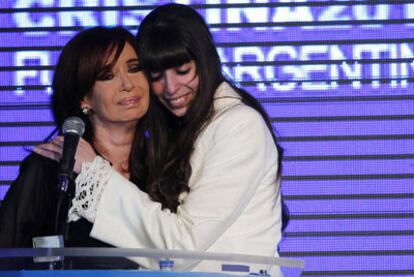Argentina president on victory parade
Fernández de Kirchner routs opposition in primaries ahead of October 23 poll
The results of Sunday's nationwide primary elections in Argentina show that with 98 percent of the votes tallied, President Cristina Fernández de Kirchner had already garnered 50.05 percent of the national poll, giving her more than her rivals put together, and opening the doors to an easy win in October's presidential elections.
She was followed by centrist UCR politician Ricardo Alfonsín with 12.94 percent of the vote and former caretaker president Eduardo Duhalde third with 12.05 percent. Santa Fe governor Hermes Binner running for the Socialist Broad Front was just above 10 percent.
Interior Minister Florencio Randazzo announced that more than 75 percent of registered voters took part in the primaries, the first time they have been held simultaneously and with voting mandatory. Sunday's primary elections were a nationwide opinion poll because most parties had already chosen their candidates and the 28.9 million voters could cast ballots for any party's candidate.
To avoid a runoff, the winning candidate in the October elections must get at least 45 percent of the vote, or 40 percent with a lead of at least 10 points over the closest contender. The results show that Fernández has no real competitor. Her two main opponents, Alfonsín and Duhalde, fared worse than expected, and electoral law prohibits them from joining forces and forming a new alliance.
If the president gets a similar result in the first round of voting on October 23, she will win a third term for her center-left faction of the Peronists and avoid the need for a runoff on November 20.
"This is recognition of all the work, the effort, everything that has been accomplished in the past eight years, but also for what we still need to do," Fernández de Kirchner, 58, told supporters on Sunday night in Buenos Aires. "My only promise is to keep working for everything we still need."
No major incidents were registered during the day, although some people claimed that several polling stations lacked specific ballots. The primaries were celebrated as the electorate voted to choose candidacies for public office, locally and nationally, which will enable parties and coalitions to run in the October 23 general elections.
Voters cast their votes to elect president and vice president (across the country), governors (in four provinces, including the crucial Buenos Aires province), 24 senators (Buenos Aires, Formosa, Jujuy, La Rioja, Misiones, San Juan, San Luis and Santa Cruz provinces), 130 lawmakers (Buenos Aires City and all provinces), mayors and councilors.
Elections were held simultaneously in Argentina's 24 provinces, open to all potential candidates regardless of party affiliation. In order to be approved for October's elections, candidates must obtain a minimum of 1.5 percent of the valid votes.
Fernández succeeded her late husband, Néstor Kirchner, in 2007. Her victory was widely attributed to popular support for Kirchner, whom many Argentineans credited with reviving the county's economy after its collapse in 2001, when Argentina suffered an acute financial crisis and defaulted on its sovereign debt.
In 2008 her popularity rating fell below 30 percent after a four-month tax revolt by farmers, an important force in the country. But strong economic growth since then has helped to create jobs, increase wages and allow the government to extend welfare programs. The death of her husband in October 2010 pushed her popularity ratings up again.

Tu suscripción se está usando en otro dispositivo
¿Quieres añadir otro usuario a tu suscripción?
Si continúas leyendo en este dispositivo, no se podrá leer en el otro.
FlechaTu suscripción se está usando en otro dispositivo y solo puedes acceder a EL PAÍS desde un dispositivo a la vez.
Si quieres compartir tu cuenta, cambia tu suscripción a la modalidad Premium, así podrás añadir otro usuario. Cada uno accederá con su propia cuenta de email, lo que os permitirá personalizar vuestra experiencia en EL PAÍS.
¿Tienes una suscripción de empresa? Accede aquí para contratar más cuentas.
En el caso de no saber quién está usando tu cuenta, te recomendamos cambiar tu contraseña aquí.
Si decides continuar compartiendo tu cuenta, este mensaje se mostrará en tu dispositivo y en el de la otra persona que está usando tu cuenta de forma indefinida, afectando a tu experiencia de lectura. Puedes consultar aquí los términos y condiciones de la suscripción digital.








































